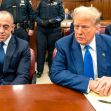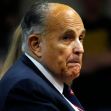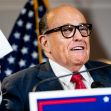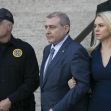The wise Watergate advice to “follow the money” has now led to the convictions of two former associates of Rudolph W. Giuliani for campaign finance violations during the ill-fated campaign to re-elect ex-President Donald Trump. Lev Parnas, a Russian-born Florida businessman, and one of his business partners were convicted of directing money raised from Russian tycoons into several American political campaigns.
After only five hours of deliberation, a jury in Federal District Court in Manhattan, on October 22, found Parnas and Andrey Kukushkin guilty on five counts related to their fundraising schemes to use Russian money to enrich the coffers of Republican and pro-Trump committees. They sought to elect candidates who would trade these foreign funds for political favors that were often designed to enrich themselves.
Two other ex-associates of the ex-President’s erstwhile lawyer, Igor Fruman and David Correia, had previously pleaded guilty to similar campaign finance law violations.
Both Parnas and Fruman were charged with attempting to trade political contributions to several politicians in exchange for their help in obtaining licensing approvals for a cannabis company they were starting. Parnas was also convicted of channeling Fruman’s funds through a phony company to the Republican Party and pro-Trump PACs, then lying about the transfers to the Federal Election Commission (FEC).
The charges could land Parnas in jail for up to five years for the first five counts and the sixth count, related to falsifying records to the FEC, carried a 20-year maximum sentence.
Parnas was arrested at Washington, D.C.’s Dulles Airport in 2019 while he was attempting to board a plane to Frankfort, Germany. He had a one-way ticket. During the next two years, his role in urging Ukrainian officials to investigate Hunter Biden and link his activities to his father was uncovered.
During the trial, prosecutors described how Parnas lied to the FEC about campaign donations they obtained from Russian millionaire Andrey Muraviev, Parnas’ partner in a marijuana business. Evidence showed that two different companies owned by Muraviev had each wired $500,000 to Global Energy Producers, a company owned by Parnas and Fruman they said was created to sell U.S. natural gas to Europe to decrease sales to the Russian energy industry.
Parnas’ lawyer tried to portray his client as a confused businessman who did not understand American campaign finance laws, so he innocently violated them as he sought to open legal cannabis stores, and Co-defendant Kukushkin’s lawyer also tried to portray his client as an innocent victim who believed Parnas was politically connected and could help to him as he started his businesses. He said that Parnas had swindled his client.
Key evidence in the case included testimony from a former Trump super PAC director, an ex-chief of staff to a Republican Texas congressman, and Adam Laxalt, the 2018 Republican candidate for Nevada governor. The jury was also provided documentary evidence including receipts for campaign contributions, bank records, and logs of “WhatsApp” messages that were exchanged by the accused. They were presented with several text messages between Parnas, Kukushkin, Fruman, and Muraviev. One message was a text from one of Parnas’ assistants that asked when “Adam Laxalt’s team” could expect checks. Another message, discussing transfers, prompted Parnas to write that he “did not want to discuss everything over text.”
Other exchanges between defendants and Russian millionaires included pictures of Parnas and Fruman with important political figures, including Trump; Giuliani; Ron DeSantis, now Governor of Florida, but a candidate at the time; as well as Jared Kushner and Ivanka Trump. The purpose of the photos seemed to be to show how close defendants were to key Republican figures who could be useful to the interests of the Russians.
Parnas and Giuliani first met when the ex-President’s ex-lawyer traveled to Kyiv where he tried to convince Russian officials to investigate Hunter Biden. Parnas also communicated frequently with Ukraine’s chief prosecutor to urge him to remove Marie Yovanovitch as U.S. ambassador to Ukraine. During Trump’s impeachment trial a video was shown that showed Parnas telling Trump that Yovanovitch, who was appointed by President Clinton, had been criticizing Trump. It showed Trump responding by saying, “Get rid of her.”
The next year, Trump denied ever meeting Parnas, but CNN documented and reported eight times when Parnas and Trump met.
The prosecutors’ case also included records that showed a $325,000 donation to American First Action, Inc., Trump’s super PAC. Defendants had claimed the money was from a company owned by Parnas and Fruman, who said the funds were intended to demonstrate their company, Global Energy Producers, was successful and to “obtain access to exclusive political events and gain influence with politicians,” according to court papers described in the New York Times.
The Times report of the case included an interview with an unnamed juror who said he did not find the defendants’ claims of ignorance of campaign laws to be “convincing.” He was persuaded because Parnas was required to confirm that he “understood campaign finance” regulations when making contributions to PACs or candidates.
After the verdict, Damian Williams, the U.S. attorney in Manhattan said, “Campaign finance laws are designed to protect the integrity of our free and fair elections, unencumbered by foreign interests or influence. Safeguarding those laws is essential to preserving the freedoms that Americans hold sacred.”
When one block is removed from a wooden tower built in the game of Jenga, it is only a matter of time until the whole structure falls. Does the Parnas case foreshadow more charges and convictions or will the shaky, corruption-laden structure of the Trump era continue to stand?






